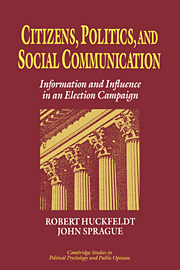Book contents
- Frontmatter
- Contents
- Acknowledgments
- I Democratic politics and social communication
- 1 The multiple levels of democratic politics
- 2 A research strategy for studying electoral politics
- II Electoral dynamics and social communication
- III Networks, political discussants, and social communication
- IV The organizational locus of social communication
- Bibliography
- Index
2 - A research strategy for studying electoral politics
Published online by Cambridge University Press: 22 March 2010
- Frontmatter
- Contents
- Acknowledgments
- I Democratic politics and social communication
- 1 The multiple levels of democratic politics
- 2 A research strategy for studying electoral politics
- II Electoral dynamics and social communication
- III Networks, political discussants, and social communication
- IV The organizational locus of social communication
- Bibliography
- Index
Summary
The substantive and theoretical aims of this project give rise to a particular set of observational challenges, and the project's design is thus motivated by several theoretical imperatives. We are arguing that citizens are interdependent – that they obtain important political information through processes of social communication – and hence democracy and democratic politics occur at multiple levels of meaning and observation. An exclusive focus on isolated citizens runs the risk of ignoring the thorough-going imbeddedness that characterizes the individual acquisition of political information. An exclusive focus on social or political aggregates runs the risk of ignoring the nonadditive consequences of social and political interaction among citizens who constitute particular electorates. As a consequence, the theoretical focus of this book is on the citizen who resides within a particular social and political setting, who obtains political information from a limited menu of alternative choices, and who thus controls the flow of information only incompletely and imperfectly.
Such a theoretical perspective has observational consequences that are far from trivial. It is not enough, for example, to add a few more questions to an interview protocol soliciting citizens' perceptions of their environments. Indeed, one of the goals of this book is to understand more fully the manner in which these very perceptions are the product of a complex interplay among individual preference, attempts at individual control, and the external constraints imposed by a particular setting.
- Type
- Chapter
- Information
- Citizens, Politics and Social CommunicationInformation and Influence in an Election Campaign, pp. 23 - 42Publisher: Cambridge University PressPrint publication year: 1995

